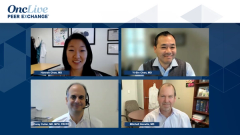
Monitoring Patients with GVHD
Drs Yi-Bin Chen, Corey Cutler, Hannah Choe, and Mitchell Horwitz discuss challenges in detecting and diagnosing chronic GVHD. The panel advocates for vigilant communication, early detection, and ongoing patient education for comprehensive post-transplant care.
Episodes in this series

This is a video synopsis of a discussion involving Dr Yi-Bin Chen, Director of the Transplant and Cell Therapy Program at Massachusetts General Hospital and Professor of Medicine at Harvard Medical School; Dr Corey Cutler, Director of the Stem Cell Transplant Program at Dana-Farber Cancer Institute and Professor of Medicine at Harvard Medical School; Dr Mitchell Horwitz, Professor of Medicine and Director of the Adult Blood and Marrow Transplant Program at Duke University, and Dr Hannah Choe, Assistant Professor and Director of the Graft-versus-Host-Disease (GVHD) program at Ohio State University.
The panel addresses the challenges of detecting and diagnosing chronic GVHD, emphasizing its pleomorphic nature. Dr Hannah Choe underscores the difficulty in assessing chronic GVHD due to its varied presentations, suggesting the importance of maintaining open communication with both providers and patients.
Dr Choe advocates for frequent follow-ups, educating patients on common symptoms such as dry eyes, skin rashes, difficulty swallowing, and loss of appetite. She stresses the need for a high suspicion level and encourages patients to reach out if they notice any abnormalities. Additionally, collaboration with patient advocacy groups and education initiatives can enhance patient awareness.
Dr Corey Cutler reinforces the idea of considering anything occurring within the first 24 months post-transplant as potentially chronic until proven otherwise. He highlights the significance of patients reaching out early to the transplant center for evaluation, avoiding misdirection by local providers.
Dr Mitchell Horwitz discusses the use of electronic medical record (EMR) systems for maintaining closer contact, including picture and video submissions. The panel collectively acknowledges the evolving burden of chronic GVHD beyond the commonly recorded two-year mark, emphasizing the need for ongoing attention in the long run.
In conclusion, the discussion highlights the importance of vigilant communication, early detection, and patient education in managing chronic GVHD, extending care beyond the immediate post-transplant period.
Video synopsis is AI-generated and reviewed by OncLive® editorial staff.





































